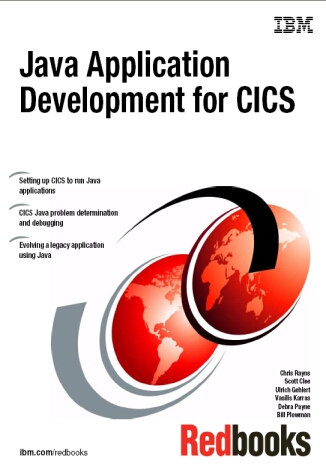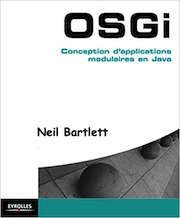
|
FreeComputerBooks.com
Links to Free Computer, Mathematics, Technical Books all over the World
|
|
- Title: Java Application Development for CICS, Fourth Edition
- Author(s) Chris Rayns, George Burgess, Scott Clee, Tom Grieve, John Taylor
- Publisher: IBM (August 14, 2005), Fourth Edition (February 2009)
- Paperback: 248 pages
- eBook: PDF, 330 pages, 4.70 MB
- Language: English
- ISBN-10: 0738493791
- ISBN-13: 978-0738493794
- Share This:

|
The prime audience of this book is CICS and z/OS system programmers who provide support for Java application development and Java application programmers who need a gentle introduction to Java development for CICS.
In this book, it assumes that you have knowledge of z/OS, CICS, UNIX System Services, and Java.
It starts by reviewing the basic concepts of the z/OS, CICS TS V3.2, and Java environments, and introduce new terminology. We then discuss the software and hardware requirements for developing and executing Java applications in CICS TS V3.2. Next we show you how to customize the application development environment, UNIX System Services, MVS, and CICS.
Additionally, it briefly discusses three possible application development roadmaps: Java application programs that use CICS services, IIOP server applications, and CICS Enterprise Beans. Subsequent chapters contain an expanded explanation and examples of Java application programs that use CICS services and how to use CICS-supplied Java class library and the Java Virtual Machine.
About the AuthorsN/A
- Advanced Java
- Mainframe Computing
- Introduction to Java, Basic Java
- Enterprise Java and Java EE (J2EE)

- Java Application Development for CICS (Chris Rayns, et al.)
- The Mirror Site (1) - PDF
- Developing Mainframe Java Applications (Lou Marco)
-
 CICS and the JVM server: Developing and Deploying Java Apps
CICS and the JVM server: Developing and Deploying Java Apps
The book begins by outlining the many advantages of its multi-threaded operation over the pooled JVM function of earlier releases. It then continues with a comparison between traditional CICS programming, and CICS programming from Java.
-
 Dynamic Proxies in Java (Heinz M. Kabutz)
Dynamic Proxies in Java (Heinz M. Kabutz)
Dynamic proxies are such a tool that we can use it to save thousands of lines of repetitive code with a single class. This book is for intermediate to advanced Java programmers who want to get to "guru" status. It is not suitable for beginners in Java.
-
 The Java Web Scraping Handbook (Kevin Sahin)
The Java Web Scraping Handbook (Kevin Sahin)
This book will teach you how to extract data from any website, how to deal with AJAX / Javascript heavy websites, break captchas, deploy your scrapers in the cloud and many other advanced techniques, using Java programming language.
-
 Naked Objects (Richard Pawson, et al)
Naked Objects (Richard Pawson, et al)
The aim of this book is to introduce you to the concept of designing business systems from naked objects, and to enable you to start building such systems using the Naked Objects framework. It outlines a lightweight methodology and provides a short tutorial.
-
 Java Transaction Design Strategies (Mark Richards)
Java Transaction Design Strategies (Mark Richards)
This book is about how to design an effective transaction management strategy using the transaction models provided by Java-based frameworks such as EJB and Spring. Techniques, best practices, and pitfalls with each transaction model will be described.
-
 Object-Oriented vs. Functional Programming (R. Warburton)
Object-Oriented vs. Functional Programming (R. Warburton)
This book discusses similarities between these programming paradigms and points out that both FP and OOP are actually moving closer toward one another. One prominent example is the use of lambda expressions in Java and other OOP languages.
-
 High-Performance Java Platform Computing
High-Performance Java Platform Computing
Threading and concurrency are crucial to building high-performance Java applications. This book thoroughly demystifies them, helping developers leverage threading and concurrency to solve a wide variety of performance problems.
-
 Docker for Java Developers (Arun Gupta)
Docker for Java Developers (Arun Gupta)
This book introduces basic Docker concepts and explains how to achieve faster startup and deployment of your Java‑based applications, shows how Docker containers can save you many headaches when it comes to packaging, deploying, and scaling your applications.
-
 OSGi In Practice (Neil Bartlett)
OSGi In Practice (Neil Bartlett)
This book is a comprehensive guide to OSGi with two primary goals: first introducing to OSGi concepts with examples, then exploresing numerous practical scenarios and techniques, as well as answering questions.
-
 Building Reactive Microservices in Java (Clement Escoffier)
Building Reactive Microservices in Java (Clement Escoffier)
This book is for developers and architects interested in developing microservices and distributed applications. It does not explain the basics of distributed systems, but instead focuses on the reactive benefits to build efficient microservice systems.





